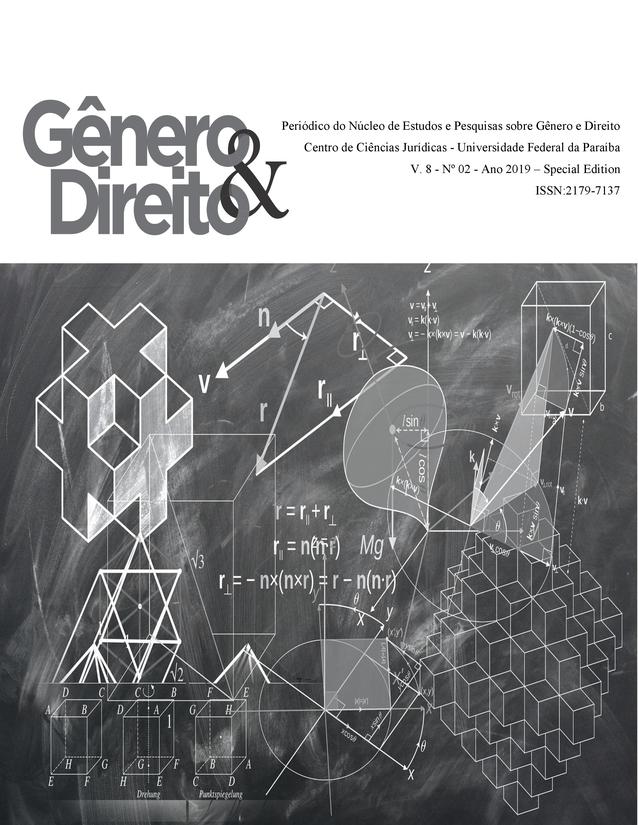A SURVEY OF FEMINISM ASPECTS IN THE NOVEL OF “HOUSE OF EDRISIS” AUTHORED BY GHAZALEH ALIZADEH
DOI:
https://doi.org/10.22478/ufpb.2179-7137.2019v8n2.46465Palavras-chave:
Ghazaleh Alizadeh, House of Edrisis, Feminist Thinking, Liberal FeminismResumo
Ghazaleh Alizadeh is an Iranian female writer and critic. In the novel of “House of Edrisis”, which is one of her most important works, she shows her feminist thinking in various ways. In this work, she criticizes the culture of patriarchy, marriage, and motherhood. In addition, judicial and legal laws, such as permission for polygamy, are challenged by Alizadeh in this work. She believes that patriarchy has intruded the mind of the society members, including men and women, and one way to clear the minds of people of this concept is respecting and honoring women. She also demands equal rights for women in terms of the right to education and the right to work. Evaluation of female characters in this work reveals that Roxana (the symbol of liberal feminist women) is the ideal character of Alizadeh, and Mrs. Edrisi and Ligha, who were submissive women in the patriarchy culture, start to fight along with men. According to Alizadeh, the only way for victory of women is their acquaintance with their abilities and rights and ending patriarchal domination. In this paper, we analyze her thoughts with regard to the different feminist doctrinesDownloads
Referências
Abbott, Pamela; Kells, Wallace (2002), Women's Sociology, Translated by Manijeh Najm Araqi, Tehran: Ney Publications.
Arianpour Kashani, Manouchehr (1998), The Aryanpur Progressive English-Persian Dictionary, Tehran: Jahan Rasaneh Journal of Electronic Publishing.
Eslamlou, Naeimeh; Zaman Vaziri, Mohammad Hassan (2012), Woman, Historical Oppression, Equal Oppression, Tehran: Talavat Aramesh Publications.
Bostan, Hossein (2010), Inequality and Sexual Oppression from the Perspective of Islam and Feminism, Qom: Research Institute of Hawzeh and University.
Paknia, Mahboubeh; Mardiha, Morteza (2009), Gender Domination, Tehran: Ney Publications.
Daryaei, Touraj; Jalilian, Azarmeidokht (2014), Cyrus the Great King of Iran, Tehran: Tous.
De Beauvoir, Simone, (2004), Second Gender, Translated by Ghasem Safavi, Terhan: Tous Publications.
Rezvani, Mohsen (2005), End of Gender, Tehran: Andisheh Club.
Reuters, George (1995), The Theory of Sociology in Contemporary Times, Translated by Mohsen Talash, Tehran: Scientific Publications.
Alizadeh, Ghazale (1998), House of Edrisis, Tehran: Tous Publications.
Ghaemi, Ali (2008), Family Life System in Islam, Tehran: Parent-Teacher Association of Iran.
Mousavi, Alireza (2006), The Image of Woman in the Quran, Tehran: Woman Social Council.
Moshirzadeh, Homeira (2004), From Movement to Social Theory, Tehran: Shirzadeh Publications.
Nercissians, Emilia (2004), Anthropology of Gender, Edited by Bahman Nourzadeh Chekini, Tehran: Afkar Publications.
B) Articles
Tajik, Mohammad Reza, (1998), “Postmodernism and New Social Movements”, Gofteman Journal, No. 1.
Abed Yardakani, Mohammad; Moghimi Seyfabadi, Mohsen; Rouhollah Naderi Bani, (2010), “Feminist Thinking in Iran and its Challenges”, Journal of Shiite Women's Issues, No. 25, 153-180.
Karanesheh, Mahtab, (2013), “Evaluation of Characters in Works of Ghazaleh Alizadeh”, Piadero Literary Magazine.
Rouzbehani, Mostafa (1997), “A woman Who Denied Her Being a Woman”, Zane-Rooz Journal, No. 23, 5-25.
Lorraine, Code (2003), “Epistemology and Feminism”, Translated by Fatemeh Minaei, Naghed Journal, No. 1, 159-166.
C) Thesis
Gholizadeh, Zahra (2011), “Review and Analysis of Fiction Works by Ghazaleh Alizadeh”, MSc Thesis, Tarbiat Modares University.

